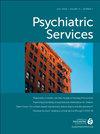Influenza and COVID-19 Vaccine Uptake Among Individuals With Versus Without Diagnosed Psychiatric Disorders.
IF 3.3
3区 医学
Q1 HEALTH POLICY & SERVICES
引用次数: 0
Abstract
OBJECTIVE The authors sought to examine influenza and COVID-19 vaccine uptake among individuals diagnosed as having psychiatric disorders compared with those without such diagnoses and to examine variations in vaccine uptake by sociodemographic and clinical characteristics. METHODS The study was conducted in the Kaiser Permanente Georgia, Washington, and Southern California health care systems. Individuals with psychiatric conditions had at least one diagnosis of any psychiatric disorder during a 12-month study period; individuals in the control group had no psychiatric disorder diagnoses during this period, and the two groups were matched on age and sex. Bivariate analyses were conducted with Pearson chi-square tests; multivariate analyses were used to calculate the odds of receiving an influenza vaccine (N=1,307,202 individuals) or COVID-19 vaccine (N=1,380,894 individuals) and were controlled for selected covariates. RESULTS After controlling for relevant confounders, the authors found that having a diagnosis of any psychiatric illness was associated with significantly increased odds of receiving an influenza vaccine (OR=1.18; 95% CI=1.17-1.19, p<0.001), compared with no diagnosis of a psychiatric disorder. Having any psychiatric illness was associated with decreased odds of receiving a COVID-19 vaccine (OR=0.97; 95% CI=0.96-0.98, p<0.001), after the analysis was controlled for the same covariates. CONCLUSIONS The findings provide evidence that people with mental health conditions were more likely to receive an influenza vaccine but were less likely to receive a COVID-19 vaccine, compared with individuals without such conditions. However, the vaccination rates observed for individuals with and without diagnosed psychiatric conditions were below national benchmarks, suggesting room for improving vaccine uptake in both patient populations.有无确诊精神障碍患者的流感和 COVID-19 疫苗接种率。
目的作者试图研究被诊断为患有精神障碍的患者与未被诊断为患有精神障碍的患者在流感疫苗和 COVID-19 疫苗接种率方面的差异,并研究疫苗接种率在社会人口学和临床特征方面的差异。方法该研究在乔治亚州、华盛顿州和南加州的凯撒医疗保健系统中进行。在为期 12 个月的研究期间,患有精神疾病的患者至少被诊断出患有一种精神疾病;对照组的患者在此期间未被诊断出患有精神疾病,两组患者的年龄和性别相匹配。采用皮尔逊卡方检验进行二变量分析;采用多变量分析计算接种流感疫苗(1,307,202 人)或 COVID-19 疫苗(1,380,894 人)的几率,并对选定的协变量进行控制。结果在控制了相关混杂因素后,作者发现与未诊断出精神障碍相比,诊断出患有任何精神疾病与接种流感疫苗的几率显著增加有关(OR=1.18;95% CI=1.17-1.19,p<0.001)。结论:研究结果证明,与没有精神疾病的人相比,有精神疾病的人更有可能接种流感疫苗,但接种 COVID-19 疫苗的可能性较低。然而,在有精神疾病和无精神疾病的人群中观察到的疫苗接种率均低于国家基准,这表明这两个人群的疫苗接种率都有提高的空间。
本文章由计算机程序翻译,如有差异,请以英文原文为准。
求助全文
约1分钟内获得全文
求助全文
来源期刊

Psychiatric services
医学-公共卫生、环境卫生与职业卫生
CiteScore
5.80
自引率
7.90%
发文量
295
审稿时长
3-8 weeks
期刊介绍:
Psychiatric Services, established in 1950, is published monthly by the American Psychiatric Association. The peer-reviewed journal features research reports on issues related to the delivery of mental health services, especially for people with serious mental illness in community-based treatment programs. Long known as an interdisciplinary journal, Psychiatric Services recognizes that provision of high-quality care involves collaboration among a variety of professionals, frequently working as a team. Authors of research reports published in the journal include psychiatrists, psychologists, pharmacists, nurses, social workers, drug and alcohol treatment counselors, economists, policy analysts, and professionals in related systems such as criminal justice and welfare systems. In the mental health field, the current focus on patient-centered, recovery-oriented care and on dissemination of evidence-based practices is transforming service delivery systems at all levels. Research published in Psychiatric Services contributes to this transformation.
文献相关原料
| 公司名称 | 产品信息 | 采购帮参考价格 |
|---|
 求助内容:
求助内容: 应助结果提醒方式:
应助结果提醒方式:


